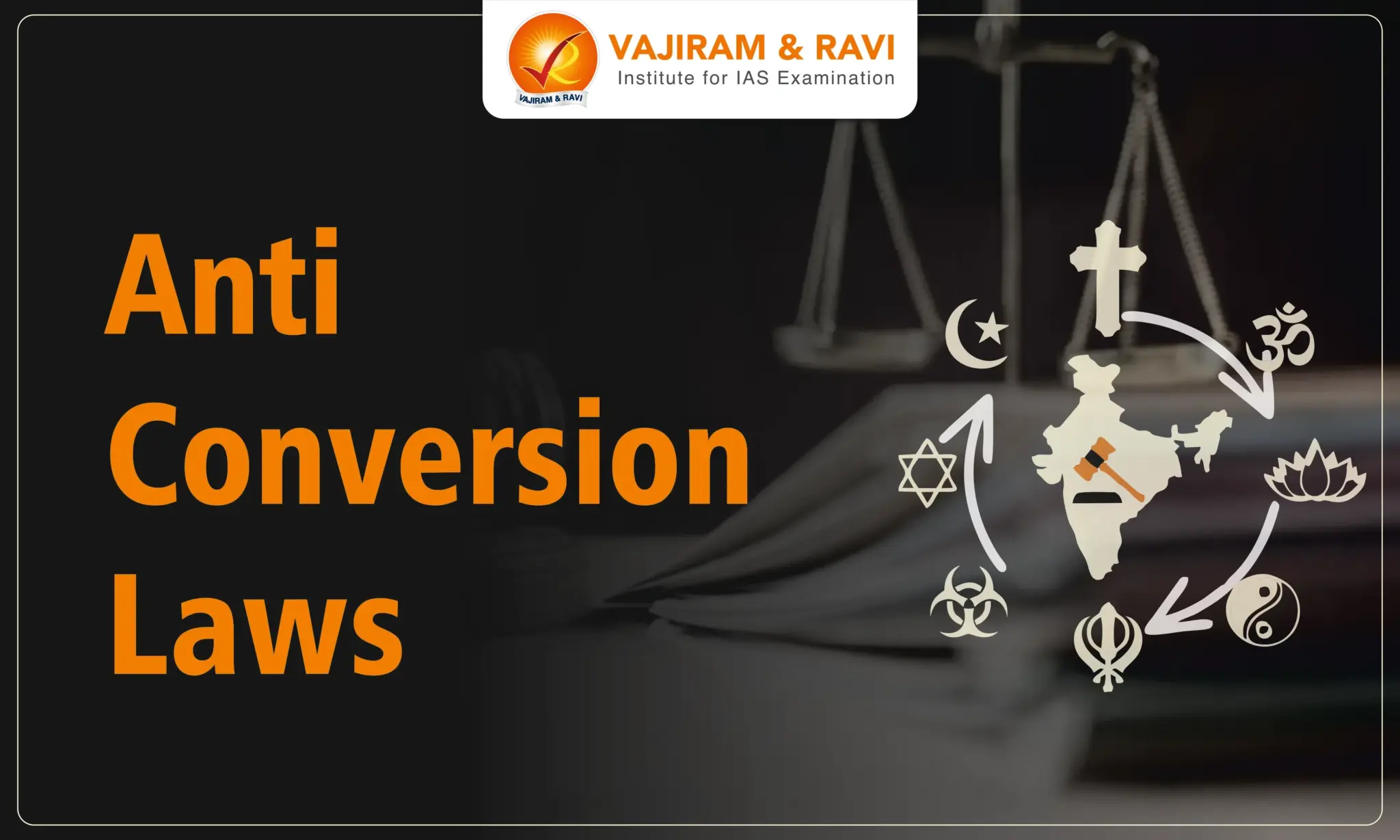Anti-conversion laws are a set of legal rules that aim to regulate religious conversions by preventing coercion and fraudulent means of changing one’s faith. These laws also require individuals to obtain government permission before converting to another religion.
Several States in India are enacting anti-conversion legislation to prevent forcible religious conversion. However, it has sparked debates about the intent of the laws, misuse of laws and fundamental rights of citizens to practise their religion as well as personal choice and liberty of the individuals.
What Are Anti-Conversion Laws?
Anti-conversion laws are legislative frameworks designed to regulate religious conversions by penalising forced, fraudulent, or incentivised conversions. These laws, often referred to as Freedom of Religion Acts, mandate that religious conversions should occur only through personal conviction rather than by force, allurement, or deceit. Key features of Anti-Conversion Laws include:
- Prohibition on Forced Conversions: These laws specifically prohibit converting someone through coercion, fraud, undue influence, or financial incentives.
- Notification Requirements: In some states, individuals intending to convert must inform district authorities in advance.
- Punitive Measures: Penalties for violating these laws vary by state and may include fines and imprisonment.
Need for the Anti-Conversion Laws
Anti-conversion laws in India aim to address forced or coerced religious conversions by preventing manipulation, fraud, or inducement. These laws also seek to protect individuals’ rights and maintain communal harmony in diverse communities.
- Forced Conversions: Anti-conversion laws are required to prevent coercion, fraud, or inducement in religious conversions. There have been reports of forced conversions, particularly in religiously and culturally diverse areas.
- For example, Between January 2021 and April 2023, 427 conversion-related cases were reported in Uttar Pradesh.
- Upholding Fundamental Rights: The Constitution of India, through Article 25, grants freedom of religion while allowing reasonable restrictions. Anti-conversion laws are designed to maintain this balance by ensuring conversions happen voluntarily.
- Preventing Misuse: Anti-conversion legislation is critical in combating cases in which individuals are allegedly coerced, induced, or allured into converting to another religion, often through the promise of financial and material benefits or even false marriage.
- Religious Demographic: Concerns have been raised about demographic shifts caused by religious conversions, and it is perceived as a threat to the majority religion. As a result, polarising propaganda, hate speech, and misinformation have spread, exacerbating the need for legislative intervention.
- Social Harmony: Anti-conversion legislations are necessary for maintaining communal harmony and mitigating potential religious tensions or conflicts caused by accusations of forced conversions.
- SC Observation: The Supreme Court of India has acknowledged that forced religious conversion is a “serious issue” that violates the Constitution. The court also stated that all religious conversions are not illegal and that every individual has the right to choose their religion.
- Unethical Conversion Practices: Proponents of anti-conversion legislation frequently express concerns about the ethical implications of aggressive proselytisation or conversion efforts perceived as manipulative or deceptive.
Status of Anti-Conversion Laws in India
Anti-conversion laws in India date back to pre-independence, initially enacted by Hindu-led princely states to resist British missionary influence. These anti-conversion laws were introduced during the 1930s and 1940s. Although national anti-conversion bills faced opposition post-independence, twelve states now enforce varied anti-conversion laws.
- Early Attempts: The Indian Conversion (Regulation and Registration) Bill was introduced in 1954 to enforce “missionary licensing and conversion registration with government officials.” The bill failed because it lacked majority support in the Lok Sabha.
- Since then, attempts have been made but have not been successful at the national level because law and order is a state subject under the Indian Constitution.
- Constitutional Provisions: According to Article 25 of the Indian Constitution,” All persons are equally entitled to freedom of conscience and the right to freely profess, practise, and propagate religion, subject to public order, morality, and health”.
- However, there is no mention of conversion in the Constitution anywhere.
- Current Status: There is no national anti-conversion law in India, but many states have enacted their own laws. The Orissa Freedom of Religion Act of 1967 was the country’s first law prohibiting forced religious conversions.
- States like Chhattisgarh, Gujarat, Jharkhand, Uttarakhand, Uttar Pradesh, and Himachal Pradesh have enforced and amended anti-conversion laws.
Issues Associated with the Anti-Conversion Laws
Anti-conversion laws in India, while intended to prevent forced conversions, raise concerns regarding religious freedom due to ambiguous language, potential infringements on fundamental rights, impacts on minority communities, and constitutional challenges.
- Vague Terminology: Terms like “force,” “inducement,” and “allurement” are often left undefined, leading to potential misuse of the law. These ambiguities have resulted in concerns that the laws can be interpreted broadly to target specific groups or individuals.
- For example, UP’s Prohibition of Unlawful Conversion of Religion Act, 2021 punishes “attempted” conversions with up to 5 years imprisonment. However, what an attempted conversion covers is not defined clearly.
- Violation of Fundamental rights: Anti-conversion legislation is seen as infringing on the fundamental right to freedom of religion and conscience guaranteed by the Constitution and international human rights instruments.
- Critics see it as a blanket restriction on the right to choose or change one’s faith.
- Violation of International Religious Protections: Anti-conversion laws criminalise conversions, which violates Article 18 of the Universal Declaration of Human Rights and Article 18 of the International Covenant on Civil and Political Rights (ICCPR), protecting the right to adopt the religion of choice.
- Targeting Minority Communities: Some critics believe that anti-conversion laws disproportionately affect religious minorities, particularly Christians and Muslims, who often engage in proselytising. These communities view such laws as attempts to restrict their religious activities.
- Constitutional Challenges: Many cases have been filed in various courts challenging the constitutionality of anti-conversion laws. Opponents argue that these laws conflict with the secular nature of the Indian Constitution and its guarantee of freedom of conscience.
Anti-Conversion Laws Related SC Judgements
The Supreme Court has delivered significant judgments on anti-conversion laws, affirming the right to personal autonomy in matters of religion and marriage while upholding public order. Significant cases include Rev. Stanislaus (1977), Sarla Mudgal (1995), Lata Singh (2006), K.S. Puttaswamy (2017), and Hadiya (2018).
- Rev. Stanislaus v. State of Madhya Pradesh and Orissa (1977): The Supreme Court upheld the constitutionality of anti-conversion laws, ruling that the right to propagate religion does not include the right to convert others and that forced conversions can disrupt public order.
- Sarla Mudgal v. Union of India (1995): The Court affirmed the right to marry a person of one’s choice, regardless of religion or social status, and emphasized the need for a Uniform Civil Code. It also stated that conversions for ulterior motives are not genuine.
- Lata Singh v. State of Uttar Pradesh (2006): The Court upheld the right to marry a partner of choice, regardless of religion or caste, and ruled that any interference with this right infringes on individual freedom.
- ‘Right to Privacy’ Judgment (2017): The Court recognised the autonomy of individuals to make decisions in vital matters concerning their lives.
- Hadiya vs. Ashokan K.M. (2018): Also known as the Hadiya case, the Supreme Court upheld the right of adult individuals to choose their religion and marry according to their personal choice.
- This verdict reinforced the individual’s right to conversion through marriage, emphasising the principle of personal autonomy.
Anti-Conversion Laws Way Forward
Anti-conversion legislation is a complex issue that necessitates a multifaceted approach that recognises the complexities involved while prioritising both religious freedom and the protection of vulnerable communities, as well as preventing forced conversions.
- Review Existing Legislation: Conduct a thorough review of existing anti-conversion legislation to ensure clarity, remove ambiguity and align with constitutional guarantees of religious freedom.
- No Discrimination: Conversion laws must be strengthened with rights and a strengthened legal framework to prevent the use of coercion and force; however, they must not discriminate between religions in identifying perpetrators.
- Balanced Approach: A balance must be struck between protecting individuals from coercive or fraudulent conversions and upholding the right to religious freedom.
- Multi-Stakeholder Involvement: Facilitate dialogues and consultations with religious leaders, civil society organisations, legal experts, and representatives from various religious communities to ensure inclusivity and fairness.
Last updated on July, 2025
→ UPSC Notification 2025 was released on 22nd January 2025.
→ UPSC Prelims Result 2025 is out now for the CSE held on 25 May 2025.
→ UPSC Prelims Question Paper 2025 and Unofficial Prelims Answer Key 2025 are available now.
→ UPSC Calendar 2026 is released on 15th May, 2025.
→ The UPSC Vacancy 2025 were released 1129, out of which 979 were for UPSC CSE and remaining 150 are for UPSC IFoS.
→ UPSC Mains 2025 will be conducted on 22nd August 2025.
→ UPSC Prelims 2026 will be conducted on 24th May, 2026 & UPSC Mains 2026 will be conducted on 21st August 2026.
→ The UPSC Selection Process is of 3 stages-Prelims, Mains and Interview.
→ UPSC Result 2024 is released with latest UPSC Marksheet 2024. Check Now!
→ UPSC Toppers List 2024 is released now. Shakti Dubey is UPSC AIR 1 2024 Topper.
→ Also check Best IAS Coaching in Delhi
Anti-Conversion Laws FAQs
Q1. What are the anti-conversion laws in India?+
Q2. What are the anti-conversion laws in the US?+
Q3. What is the Supreme Court anti conversion law?+
Q4. Is conversion for marriage legal in India?+
Q5. What are the disadvantages of anti conversion law?+
Tags: anti-lonversion laws quest















